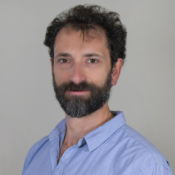ASU bioethicist argues for changing how novel scientific technologies are regulated
On the fiftieth anniversary of the famous Asilomar Conference, which set a precedent of scientific self-regulation, Benjamin Hurlbut argues it’s time for change
In 1975, a group of biologists gathered to do something unprecedented for their time: come up with guidelines to regulate their own research on novel genetic technologies. The initiative that scientists took to regulate themselves at that meeting, known as the Asilomar Conference, has been held up as a standard of scientific responsibility since. However, in a recent editorial for Science Magazine, bioethicist Benjamin Hurlbut argues that it’s time to leave the precedent that Asilomar set behind to change the way that research on novel technologies is governed.
“Asilomar was not, in the moment, designed to have the legacy that it has had,” Hurlbut, a professor in the Biology and Society program, explains. “But nevertheless, it has had the important legacy of a paradigm of scientific self-regulation as the right way to govern emerging science and technology. And that is a counterproductive or even corrosive approach.”
In his editorial, Hurlbut explains that the Asilomar Conference set a precedent that scientists are the people most fit to regulate their own research, as they are the experts on the emerging technologies they work with. Regulation from non-experts, scientists assume, would only interfere with technological progress. Hurlbut contends that such an approach is problematic because it limits the kinds of concerns that regulation discussion take into account.
"That approach is exclusionary.... it is built around a particular kind of notion of who knows best. The notion that anyone else is going to get it wrong because they don’t know as much can be a way of rejecting a diversity of perspectives.”
Excluding non-experts from regulation decisions often means that those decisions are made without considering larger social consequences, Hurlbut argues. That’s especially important because biotechnologies do affect people beyond research labs; emerging technologies, like certain genome editing techniques, might pose threats like environmental contamination or human health risks, for example. Those are risks that non-experts can and should weigh in on.
“When you get a narrower, less imaginative group of people to deal with complex problems, you get narrower, less imaginative framings of those problems and solutions to them. That means that it may look like progress in the short term... but what you may do is produce longer term problems because you don’t think of important things that will emerge later. Or you may be silencing critique that will fester and emerge in the form of full-blown controversy down the line.”
Hurlbut recognizes that his arguments might raise concerns about slowing down the rate of scientific progress. In answer, Hurlbut advocates for a new notion of scientific progress: “It’s a problem to just assume that scientific advance equals progress. Innovation, to be good innovation, needs to be principled innovation... Science should be in service of society.”
Hurlbut declares that Asilomar’s precedent should be replaced with a new process of scientific regulation. However, he clarifies that there is no one material step that scientists should incorporate in the regulation process to better address social needs and concerns; what is needed is more of a mindset shift.
“This approach to governance has basically engendered a set of very bad habits that produce big problems. We have to de-habituate ourselves. So the fix is not, ‘stop doing this.’ It’s ‘stop having this orientation in which you’re in the habit of not thinking about what [others] want to put on the table.”
Hurlbut is working towards such a shift in orientation himself. This spring, the Global Observatory for Genome Editing, which Hurlbut co-directs, will hold a summit to try and discuss novel genetic technologies with ethical and cultural questions at the forefront.
“This summit is basically an attempt to break our bad habits by demonstrating what it looks like when we approach things the other way around, not science and technology first and ethics second, but beginning with the question of what does it mean to value human life.”


